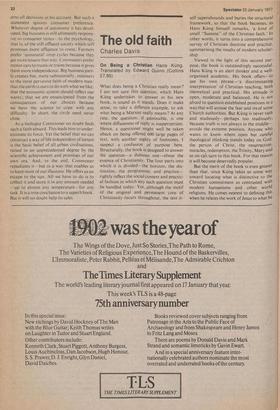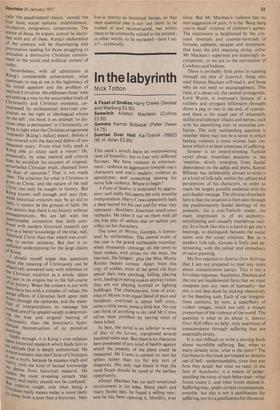The old faith
Charles Davis
On Being a Christian Hans Ming. Translated by Edward Quinn (Collins E7.95)
What does being a Christian really mean ? I am not sure this question, which Hans Kling undertakes to answer in his new book, is sound as it stands. Does it make sense, to take a different example, to ask what being a Marxist really means? At any rate, the question, if admissible, is one where diffuseness of reply is inappropriate. Hence, a questioner might well be taken aback on being offered 600 large pages of text, with another eighty of footnotes. I suspect a confusion of purpose here. Structurally, the book is designed to answer the question--a dubious one—about the essence of Christianity. The four parts into which it is divided--the horizon, the distinction, the programme, and practice— rightly reflect the social context and practical fashion in which any such question must be handled today. Yet, although the motif of the original and permanent core of Christianity ecurs throughout, the text it-.
self superabounds and buries the structural framework, so that the book becomes, as Hans Kling himself remarks, 'a kind of small "Summa" of the Christian faith.' In other words, it turns into a comprehensive survey of Christian doctrine and practice, summarising the results of modern scholarship.
Viewed in the light of this second purpose, the book is outstandingly successful. Hans Kling is an alert thinker and a wellorganised academic. His book offers—to use his own phrase—'a discriminating interpretation' of Christian teaching, both theoretical and practical. His attitude is open, moderate and balanced. He is not afraid to question established positions in a way that will arouse the fear and ire of some Church authorities. But Kling is never rash and studiously—perhaps too studiously, because truth is not always in the middle— avoids the extreme position. Anyone who wants to know where open but careful theological thinking stands today on God. the person of Christ, the resurrection, miracles, redemption, the Trinity. Mary and so on cab turn to this book. For that reason it will become deservedly popular.
But the merit of the book is even greater than that, since Kling takes us some way toward locating what is distinctive to the Christian commitment as contrasted with modern humanisms and other world religions. He comes nearest to defining this when he relates the work of Jesus to what he calls 'the quadrilateral choice,' namely the four basic social options: establishment, revolution, emigration, compromise. The stance of Jesus, he argues, cannot be identified with any of these. Kiing's elaboration of the contrast will be illuminating and Provocative reading for those struggling to articulate a distinctive Christian commitment in the social and political context of today.
Nevertheless, with all admiration at Kung's considerable achievement, what continues to nag at me is the legitimacy of his initial question and the problem of method it involves. He addresses those 'who are seeking a way to the uncurtailed truth of Christianity and Christian existence, unimpressed by ecclesiastical doctrinal constraints on the right or ideological whims ort the left'; his book is an attempt 'to discover what is permanent' in Christianity, to bring to light what the Christian programme originally [Kung's italics] meant, before it was covered with the dust and debris of two thousand years.' From what lofty peak is Kling able to attain such a vision? Or, Prosaically, by what method and criteria dues he establish his account of original, Uncurtailed Christian truth, cleansed from the dust of centuries? That is not made clear. The criterion for what is Christian is given as Christ, and the nature of the real Christ can only be sought in history. But KUng knows, well enough and says that, ‘v, hile historical criticism may be an aid to laith, it cannot be the ground of faith. He also admits that there is no history without Presuppositions. We are left with the questionable contention that faith combined with modern historical research can give us a better knowledge of the true, real, historical Christ than that which was available to earlier centuries. But that is insufficient underpinning for the large claims cif Kling.
Should myself argue that questions abnut the meaning of Christianity can be ?hjectively answered only with reference to `lic Christian tradition as a whole, taken nut just in its origins but in the full course Pi its history. When the concern is not with naclere facts but with a complex of values, the lual effects of Christian faith upon men 'n through the centuries, and the mani:yid of interpretations its message has qked, are of far greater weight in determin,Ug the true and original bearing of 't,nristianity than the historian's hyponetical reconstruction of its primitive teaChing. u°ddlY enough, it is Kiing's over-reliance Po al.:on historical research which leads him to attitude that is deeply unhistorical. He iss Most insistent that the Christ of Christians ren,?t a myth, because he equates truth and _autY with the kind of factual knowledge derive from historical research. He 0_ Ices the most revealing remark 'that aunetrY and reality should not be confused.' creatiVe insight into what being a l'-ohristian really means today is more likely ei:nne from a poet than a historian. Men live in history as historical beings, so that their essential past is not 'out there' to be looked at and reconstructed, but within them to be constantly relived in the present ; in other words, to be recreated—dare I say it ?—mythically.



































 Previous page
Previous page